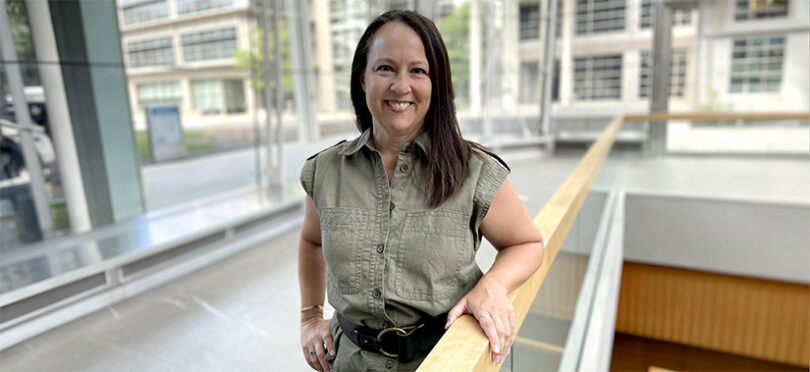Given the statistics that one in eight women will develop breast cancer in their lifetime, odds are that you’ll be impacted by the most common cancer in women in the United States, after skin cancers.
“The statistics don’t have much of an impact until you or someone you know is diagnosed with breast cancer,” said Stephanie Duncan, a breast cancer survivor. “But given the statistics, you’re likely to be impacted at some point in your life. Even men can be diagnosed with breast cancer. Early screening and self-exams are the best tools, along with education and awareness.”
In recognition of Breast Cancer Awareness Month, we’re highlighting some CalPERS team members’ survivorship stories.
Janette Novinski
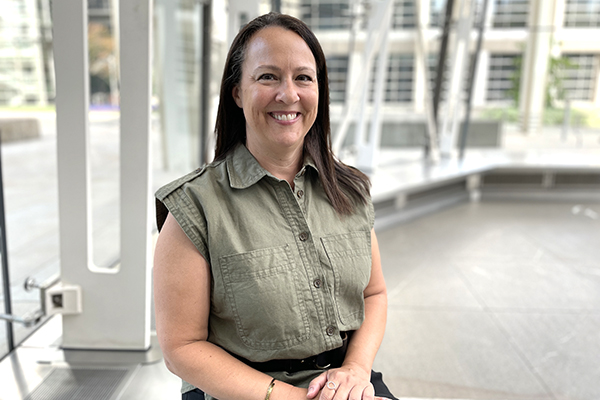
Janette Novinski was diagnosed with breast cancer on her third day working at CalPERS, just three weeks shy of her 50th birthday.
“Having learned the doctors ‘found something’ the week before, I was overwhelmed with the possibility of telling my new team leader that I may have cancer and must undergo months of treatment,” said Novinski. “Not only did my team welcome me with open arms, but my leadership team exemplified the true meaning of supportive leaders.”
Within two weeks of her diagnosis — which was stage 1, hormone-positive breast cancer that spread to her lymph nodes — Novinski had a lumpectomy, followed by four rounds of chemotherapy and 25 rounds of radiation. She now takes a hormone therapy medication due to the cancer being hormone positive. After 20 rounds of radiation, she developed pericarditis, an inflammation of the lining of the heart.
Novinski said undergoing a life-threatening disease while learning a new role and acclimating to a new work culture shaped her early experiences at CalPERS.
“In all my years working for large and small corporations, I never felt a true sense of belonging like I have here,” she said. “I lost my hair and wore a turban my first six months of employment, so my team leader suggested we dress as pirates for Halloween and all wear headpieces. I felt like I belonged despite my challenges.
“I never felt judged by anyone at CalPERS, even when presenting to large groups of people. I am forever grateful and blessed for my work family in Human Resources’ enterprise engagement unit, who I consider my angels.”
Susan Forrer
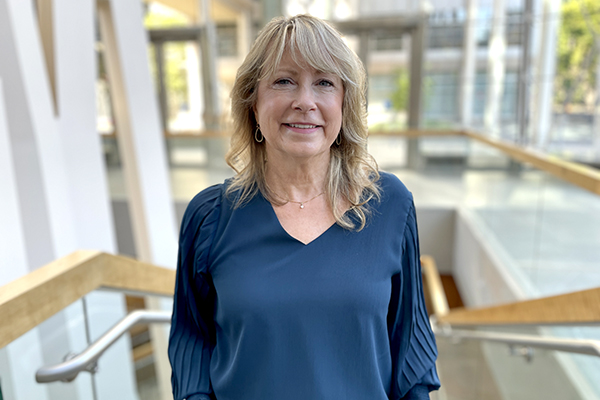
Susan Forrer’s grandmother died from breast cancer in her early 40s, so when Susan was concerned she’d suffer a similar fate, she got a mammogram that revealed a rare and aggressive type of cancer.
“I had just turned 50 when I was diagnosed,” Susan recalls. She had a lumpectomy the next week and started chemotherapy shortly after the surgery.
“I was very blessed that I didn’t have many immediate side effects from the chemo other than temporary loss of hair and taste, and sudden onset of menopause,” she says. “However I continue to experience ongoing health issues from chemo like osteoporosis.”
Following a couple months of chemotherapy, Susan underwent six consecutive weeks of daily radiation treatments. A few months later, she began her career at CalPERS and got involved in the former Jammin’ for the Cure team, which raised funds for breast cancer advocacy and research.
Today she’s grateful to be alive and wants to spread the word of early detection. “If sharing my story convinces even one person to get a mammogram, then I’m happy to share it,” she says. “I definitely know the feeling that life is short and enjoy every day like it’s my last.”
She’s more cautious of environmental toxins and cancer-causing warnings than before her diagnosis. “I’m also more spontaneous and always looking for the fun in most things,” Susan says. “If I don’t want to do something, I don’t do it — time is precious!”
Stephanie Duncan
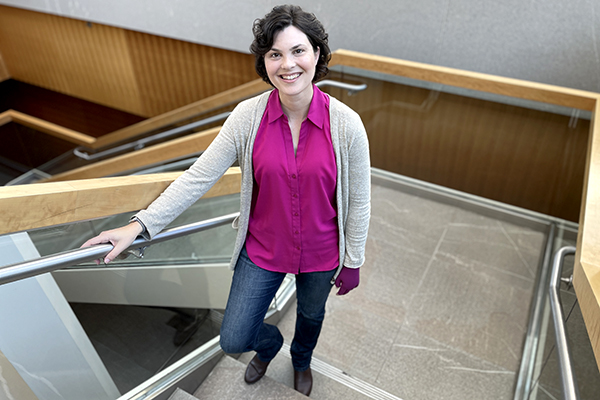
Stephanie Duncan noticed a pea-sized lump in her breast just before her 41st birthday. When it didn’t go away, she scheduled a mammogram, which led to an ultrasound and then a biopsy after. The official diagnosis came a week later, but it was several weeks before Duncan learned she had stage 1B breast cancer.
“If it had been before 2018, which is when breast cancer staging changed, I would have been considered stage 3 due to the size of the largest tumor,” she said.
Duncan underwent a double mastectomy with immediate reconstruction, 16 rounds of chemotherapy, a second surgery to remove additional lymph nodes on her left side, and 28 rounds of radiation. Today she wears a compression sleeve on her left arm and hand to deal with mild lymphedema and takes medication daily.
At 44, Duncan is focused on sharing her experience in hopes of helping others facing a breast cancer diagnosis. “Surviving breast cancer has caused me to reprioritize what’s important in my life and cherish the time I have,” she said. “I’ve been taking more trips, getting involved in new activities, and spending time with people I care about.”
Yvonne Guerra
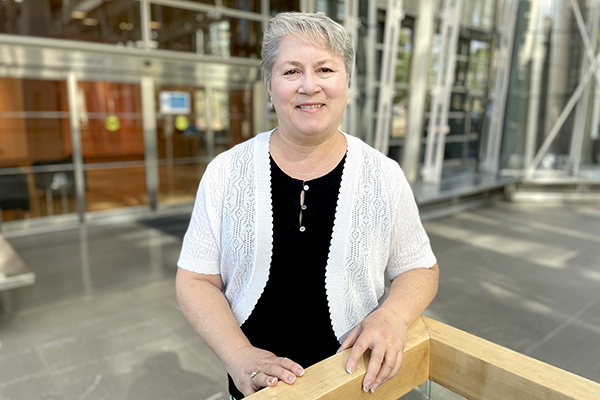
Yvonne Guerra wasn’t going to let something like breast cancer get in the way of her daughter’s senior year of high school.
“There was a trip to New York with her dance team coming up. Her high school graduation and 18th birthday were right around the corner,” Guerra recalled. “What an inconvenient time for this health challenge, but I told myself, ‘Cancer will not ruin any of this.’”
An initial mammogram in 2014 showed something “suspicious, but tiny.” It took more screening — another mammogram, an ultrasound, and an MRI — before a biopsy was performed and Guerra was eventually diagnosed.
In February 2015 she was diagnosed with stage 1 breast cancer in one breast that was both ductal and lobular. But she had treatment options — a lumpectomy, a lateral mastectomy, or a bilateral mastectomy. Guerra opted for a bilateral mastectomy with reconstruction, “because I did not want to go through this a second time with the left breast,” she said.
“I was already in menopause and there was no chance for more children, so I saw this as an opportunity to have breast reconstruction,” Guerra said jokingly. “Of course, life threw me a curve ball and while I was initially told I wouldn’t have to do chemo or radiation, the lymph node sample showed microscopic cancer.”
That meant four rounds of chemotherapy. “The only time I broke into tears was when I had to shave my head because my hair started falling out,” Guerra said. That was followed by getting reconstructive implants, then six weeks of radiation. But Guerra scheduled all her appointments and procedures around her daughter’s milestones. Cancer didn’t ruin a thing.
Not only is Guerra grateful for every day, but she’s also an advocate for annual mammograms. “My cancer would not have been detected through self-exams until it was in a later stage, based on where it was located,” she said.
Kim Malm
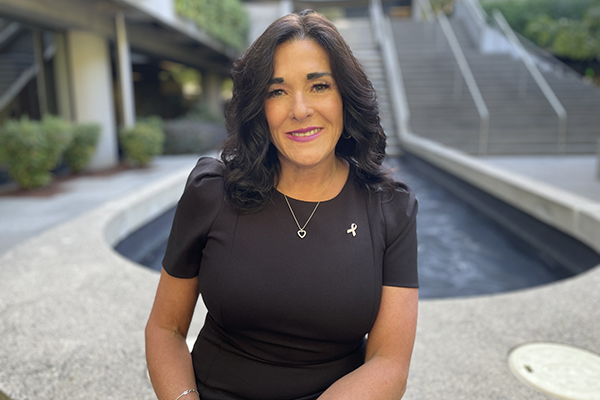
Kim Malm was getting dressed for her 40th high school reunion last month when she noticed a lump in her breast. Having battled breast cancer six years ago, CalPERS’ deputy executive officer moved past the initial shock and made an appointment with her oncologist and scheduled an ultrasound that same day.
But when she went in five days later, the ultrasound results were inconclusive, so she was scheduled for a biopsy.
She got the results the next day — benign — no cancer. Malm was ecstatic after sitting with the unknown for almost a week without being able to talk about it.
“That was a tough week, but it’s why I’m diligent about paying attention to my body every day,” she said. “It can happen anytime and can pop up again — even if you’ve had it.”
Malm was first diagnosed at 52, while she was acting as officer in charge of CalPERS during the July offsite board meeting. She got a follow-up call about her recent annual mammogram.
“I didn’t think much of it, because this happens to many women, so naturally I told them I could come in later that week or the following week when the executive team returned,” Malm recalled. “The nurse said, ‘How about tomorrow?’ Things got real, real quick.”
Malm underwent a lumpectomy but not all the cancer was removed. She then had a mastectomy and reconstruction but didn’t undergo chemotherapy because it was determined there was a low risk of the cancer returning.
Today Malm is open about her journey and some truths she’s learned, which includes being surrounded by positive people and making healthier choices. She acknowledges these choices can fluctuate when work or her home life gets busy, but her focus on better choices remains steady.
“Most stress comes from the way you respond to life, not the way your life is. Adjust your attitude,” she said. “Just remember to prioritize your life, eat healthy food, exercise, have a positive attitude, nourish your tribe, and slow down and enjoy the journey.
“Clearly, the fight against cancer never really goes away,” Malm said. “I just keep doing my part by making good choices, so it doesn’t reoccur.”

